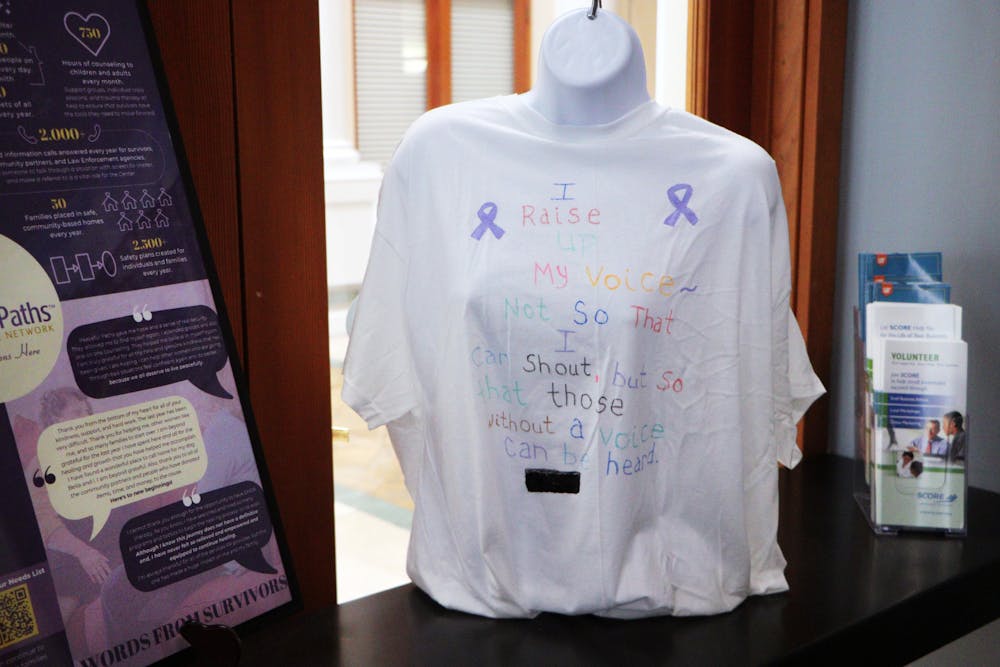Editor’s note: This story contains graphic descriptions of domestic violence.
In a journal titled “Just in case I ever think of going back,” Jenn Weber keeps a list of everything her ex-boyfriend used to say to her.
“I’ll burn the house down,” she wrote. “I should punch you in the God-d–n face.”
Weber grew up in an abusive household, she said, and was used to being treated that way. So she overlooked the warning signs. She just thought that was the way life was.
When she finally could leave, she went to Peaceful Paths — a domestic violence agency offering many different services for victims.
Weber stayed in the 32-bed long-term housing shelter that Peaceful Paths owns. During the year she stayed there, she got the emotional support she needed, and she learned how to spot the warning signs of abuse so she wouldn’t be in that situation again.
“It was so nice to have somewhere safe to go,” she said.
She often posts on Facebook advocating for domestic violence awareness and shares resources that victims can use. October has been Domestic Violence Awareness Month since 1987. Each year, it is a time to acknowledge domestic violence survivors and educate people about the issue.
During the month, the organization held multiple events to promote awareness, including a guest chef cocktail party Oct. 6, which is an annual fundraiser. During the event hosted at Oak Lane Wedding and Events, guests tried food from different vendors and could bid on items in a silent auction. The event raised the organization’s goal of $100,000 to help fund the services Peaceful Paths offers.
A clothesline project exhibit was free to the public from Oct. 10-31. The project highlights the experiences of domestic violence survivors through T-shirts.
There are sites around the city including Santa Fe College, the Gainesville Area Chamber of Commerce and Gray Robinson law firm.
At the Gainesville Area Chamber of Commerce a T-shirt covers a mannequin torso. Phrases like “it’s your fault” and “it was just a fight” are written in colorful markers, representing words a victim of domestic violence might hear. Next to the shirt, an infographic about domestic violence and Peaceful Paths services is available.
“Education and awareness are important so that people can break the cycle,” Weber said.
Theresa Beachy, Peaceful Paths’ executive director, said domestic violence is prevalent in Gainesville. In Alachua County — where there are less than 300,000 people — there are close to 2,000 arrests for domestic violence related crimes every year, she said.
But that’s just according to law enforcement reports. Only 20-30% of victims call the police, she said.
Many calls to police fail due to lack of evidence. The number of cases doesn’t represent the full spectrum of what’s going on in the community, she said.
Peaceful Paths has many different resources including a 24-hour helpline, a 46 bed emergency shelter, a 32 bed long term housing shelter and outreach services such as crisis counseling and support groups.
Some women who experience violence may not even think it’s domestic violence because it’s not the typical form of hitting or punching, Beachy said. Domestic violence also includes less-talked-about types like mental abuse, manipulation and stalking.
“It’s that silence that creates an environment of tolerance,” Beachy said.
Colleen Trojbom, a staff therapist at victim services organization Child Advocacy Center, said some don’t report domestic violence because they’re nervous the abuser will retaliate and hurt the victim more severely.
It’s important to educate the public on domestic violence because there are many misconceptions, Trojbom said. There’s domestic violence, which is defined as violence between and among those in the same household, she said. But, there’s also intimate partner violence, which is violence between people in a romantic relationship.
Intimate partner violence is always domestic violence, but domestic violence isn’t always intimate partner violence, she added.
Another misconception often, she said, is the question: If the person experiencing domestic violence was being harmed, why didn’t they just leave?
Often there’s emotional abuse, she said, including a person threatening to harm themselves or someone else if the other person leaves. There’s also financial control where the victim can’t leave because the other person has all of the money, she said.
It’s important to know of misconceptions like this so everyone gets the support they need, Trojbom said.
Contact Alexa Herrera at aherrera@alligator.org. Follow her on Twitter @alexaherrera

Alexa Herrera is a junior journalism major who is the metro general assignment reporter for The Alligator. She is also a copy editor for The Florida Political Review and a member of Kappa Kappa Gamma. In her free time she enjoys cheering on the New York Rangers during hockey season, listening to Harry Styles and spending time with her friends.






